30 May
1472 – Death of Jaquetta de Luxembourg, Duchess of Bedford, Countess Rivers and mother of Elizabeth Woodville. Her resting place is not known.
1525 – Wolsey proclaimed the King's pardon for the rebels involved in the Amicable Grant Rebellion.
1533 – Order of the Bath ceremony during the celebrations for Anne Boleyn's coronation. Click here to read more.
1536 - Henry VIII married Jane Seymour in the Queen’s Closet at York Place (Whitehall). Click here to read more.
1555 – Burnings of Protestant martyrs John Cardmaker (clergyman) and John Warne (upholsterer) at Smithfield
1582 – Executions of Jesuit priest Thomas Cottam at Tyburn. He was hanged, drawn and quartered along with priests William Filbie, Luke Kirby, and Laurence Richardson. He refused the offer of a pardon, as it would have involved him acknowledging Queen Elizabeth I as Supreme Head of the Church.
1593 – Death of Christopher Marlowe, playwright and poet. He was stabbed to death at a house in Deptford Strand, near London, in what has been described as a "tavern brawl". However, he was killed in a private room of a house, not a tavern. Some believe that he was assassinated.
1630 – Death of Emanuel Scrope, Earl of Sunderland. He was buried at Langar in Nottinghamshire. Scrope was married to Philadelphia Carey, granddaughter of Mary Boleyn.
1640 – Death of Sir Peter Paul Rubens, painter, in Antwerp. It is thought that he died of complications caused by gout. He was buried in the family vault at St Jacob's Church, Antwerp.
31 May
1443 - Lady Margaret Beaufort, Countess of Richmond and Derby, and matriarch of the Tudor dynasty, was born at Bletsoe Castle in Bedfordshire. Click here to read about her life.
1516 – Birth of John Harpsfield, religious writer and Catholic priest. He was born in the parish of St Mary Magdalen, Old Fish Street, London. His brother was Nicholas Harpsfield, later Archdeacon of Canterbury. Nine of his sermons were published in Bonner's 1555 "Homilies", and he was a well known spokesman for Catholicism, even preaching before Philip of Spain.
1529 – Opening of the Legatine Court at Blackfriars, presided over by Cardina Campeggio. This court's purpose was to hear the evidence with regards to Henry VIII's demand for an annulment of his marriage to Catherine of Aragon. Click here to read more.
1533 – Anne Boleyn's coronation procession through the streets of London, from the Tower of London to Westminster Abbey. Click here to read more.
1545 – Burial of Agnes Howard (née Tilney), dowager Duchess of Norfolk, at Thetford Abbey. She was the widow of Thomas Howard, 2nd Duke of Norfolk.
1578 – Sir Martin Frobisher set sail with his fleet from Harwich, England to Frobisher Bay, Canada. By 31st August, he and his men had mined 1370 tons of ore, which was loaded onto the ships to take back to England. Unfortunately, no gold or other precious metal was found in the ore.
1589 – Death of Sir Walter Mildmay, administrator and founder of Emmanuel College, Cambridge, at his home in Smithfield.
1 June
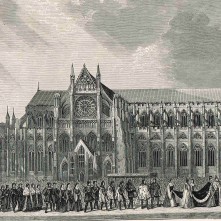
Coronation of Anne Boleyn
1451 or 1452 – Birth of Giles Daubenay, administrator, soldier, and diplomat. He was influential in Henry VII's reign, and Catherine of Aragon wrote that "he was the man who could do most in private with the king".
1563 – Birth of Robert Cecil, 1st Earl of Salisbury, politician and courtier. Cecil was the son of William Cecil, 1st Baron Burghley, and his second wife, Mildred. It was Cecil who proclaimed the accession of King James I after Elizabeth I's death.
1533 - Coronation of Queen Anne Boleyn at Westminster Abbey. Click here to read more about it.
1571 – Execution of Catholic martyr and civil lawyer John Story, at Tyburn.
1573 – Birth of explorer James Rosier in Suffolk. Rosier went on the 1605 voyage to explore the fishing grounds off the Maine coast as "cape merchant, observer, and reporter", and recorded the voyage in a journal.
1579 – Death of Robert Horne, Bishop of Winchester, at Winchester Place, Southwark. He was buried at Winchester.
1583 – Death of George Carew, Dean of Exeter and Dean of the Chapel Royal. He was buried at St Giles-in-the-Fields, London.
1593 – Inquest into the death of Christopher Marlowe after he was stabbed on the 30th May. The coroner ruled that Ingram Frizer had killed Marlowe in self-defence after a fight over a bill.
1598 – Death of Thomas Preston, playwright and Master of Trinity Hall, Cambridge. He was buried in Trinity Hall Chapel. He is best known for his play "Cambises".
1616 – Burial of Sir Thomas Parry, MP and administrator, at Westminster Abbey. His father was the Thomas Parry who was Comptroller and Treasurer of Elizabeth I's household.
2 June
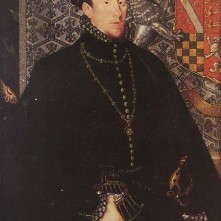
Thomas Howard, 4th Duke of Norfolk
1535 – Death of Sir Humphrey Coningsby, Judge.
1536 – Death of John Stewart (Stuart), 2nd Duke of Albany, at his château of Mirefleur in the Auvergne.
1536 – Jane Seymour's first appearance as Queen.
1537 – Executions of rebels Sir Francis Bigod, George Lumley and Sir Thomas Percy after Bigod's Rebellion in the aftermath of the Pilgrimage of Grace.
1567 – Death of Shane O'Neill, Irish chieftain. He was killed by the Scots who cut his throat.
1572 – Execution of Thomas Howard, 4th Duke of Norfolk. He was buried in the Chapel of St Peter ad Vincula at the Tower of London.
1581 – Execution of James Douglas, 4th Earl of Morton and former regent of Scotland, for treason. He was executed in Edinburgh, at the cross, by the "maiden", a type of guillotine.
1595 – Death of William Wickham, Bishop of Winchester, at Winchester House, Southwark - either this date or 12th June.
1609 – Burial of Elizabeth Russell (née Cooke), Lady Russell, linguist and courtier. She was buried at Bisham Church. She was the daughter of Sir Anthony Cooke and wife of Sir Thomas Hoby and then, after his death, Lord John Russell.
1626 – Death of Sir Edward Bromley, Judge.
1636 – Death of Theophilus Field, Bishop of Hereford. He was buried at Hereford Cathedral.
3 June
1535 - The King's former Lord Chancellor, Sir Thomas More, was interrogated in the Tower of London by Thomas Boleyn, Thomas Audley, Thomas Cromwell and the Duke of Suffolk regarding the royal supremacy. They tried to make him give them an answer as to whether the statute of supremacy was lawful. He would not give them a straight answer. Click here for more on this.
1535 – Thomas Cromwell, Henry VIII's Vicar-General, ordered all bishops to preach in support of the royal supremacy and to remove all references to the Pope from mass books and other church books.
1536 – Richard Sampson was nominated as Bishop of Chichester by Henry VIII.
1594 – Death of John Aylmer, Bishop of London, at Fulham Palace. He was buried at St Paul's Cathedral.
4 June
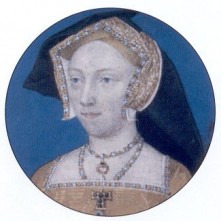
Jane Seymour
1534 – Death of Sir Edward Guildford at Leeds Castle. Guildford acted as guardian to John Dudley (future Duke of Northumberland) and held the posts of Marshal of Calais, Constable of Dover Castle and Lord Warden of the Cinque Ports.
1536 – Jane Seymour was proclaimed Queen at Greenwich Palace. Charles Wriothesley, the Tudor chronicler, recorded: “Also the 4th daie of June, being Whitsoundaie, the said Jane Seymor was proclaymed Queene at Greenewych, and went in procession, after the King, with a great traine of ladies followinge after her, and also ofred at masse as Queen, and began her howsehold that daie, dyning in her chamber of presence under the cloath of estate.”
1550 (some sources say 5th June) - Robert Dudley married Amy Robsart at the royal palace of Sheen at Richmond, near London. The marriage was attended by the then king, Edward VI.
1561 – The spire of St Paul's Cathedral caught fire after being struck by lightning. The fire melted the Cathedral's bells and lead from the spire "poured down like lava upon the roof".
1573 – Death of Sir Francis Jobson, administrator, at Monkwick, near Colchester. He was buried in St Giles, Colchester. Jobson was a member of Henry VIII's household, was Master of the Jewel House in 1553, escaped trial for supporting John Dudley in July 1553 and was pardoned by Mary I, and served Elizabeth I as Lieutenant of the Tower of London.
1590 – Baptism of William Cecil, 16th Baron Ros, courtier, ambassador. He was baptised at Newark Castle and was the son of the eldest son of William Cecil, 2nd Earl of Exeter, and Lady Elizabeth Manners.
1597 – Death of Sir Thomas Baskerville, soldier, at Picquency, in Picardy. He had served in the Netherlands under Robert Dudley, Earl of Leicester, and Peregrine Bertie, Baron Willoughby de Eresby, and was knighted in 1588 after the capture of Bergen op Zoom. He was buried in St Paul's Cathedral.
1603 – Death of Christopher Goodman, Church of England clergyman and radical Protestant, at Chester.
1626 – Burial of Thomas Howard, 1st Earl of Suffolk, naval officer and administrator, at Charing Cross, London. He was buried in the Howard vault of Saffron Walden church. He captained the Golden Lion in the struggle against the Spanish Armada in 1588.
5 June
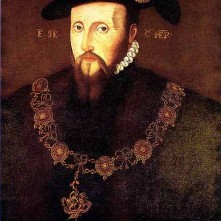
Edward Seymour
1516 – Maria de Salinas married William, 10th Lord Willoughby of Eresby. Maria was a good friend of Catherine of Aragon, and she and William were the parents of Katherine Willoughby, who went on to marry Charles Brandon, Duke of Suffolk.
1536 – Edward Seymour was created Viscount Beauchamp of Hache, Somerset, following the wedding of his sister, Jane Seymour, and Henry VIII.
1539 – Death of Brian Hygdon, Dean of York. Hygdon was close to Wolsey and Cromwell, and served on the King's Council in the North. He was buried in York Minster.
1577 – Death of John Rastell, author, Jesuit and Vice-Rector at Ingolstadt. He died in Ingolstadt.
1588 – Death of Anne de Vere (née Cecil), Countess of Oxford, at Greenwich. She was buried at Westminster Abbey. Anne was the daughter of William Cecil, 1st Baron Burghley, and his second wife, Mildred. She had been contracted to marry Philip Sidney, but married Edward de Vere, 17th Earl of Oxford in 1571. It was not a successful marriage, and the couple separated after Oxford refused to recognise their daughter, Elizabeth, as his.
1597 – Death of Sir John North, soldier, member of Parliament, Justice of the Peace and traveller. He died in the Low Countries.
1600 – Robert Devereux, 2nd Earl of Essex, was charged with insubordination during his time in Ireland at a special hearing at York House. He was ordered to remain under house arrest.
1604 – Death of Thomas Moffet, physician and naturalist, at Wilton, Wiltshire. He is known for his poem, "The Silkewormes and their Flies", which was "the first Virgilian georgic poem in English", and his work on insects, diet and eating habits.


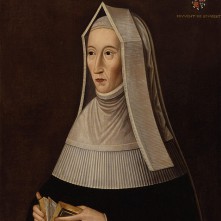
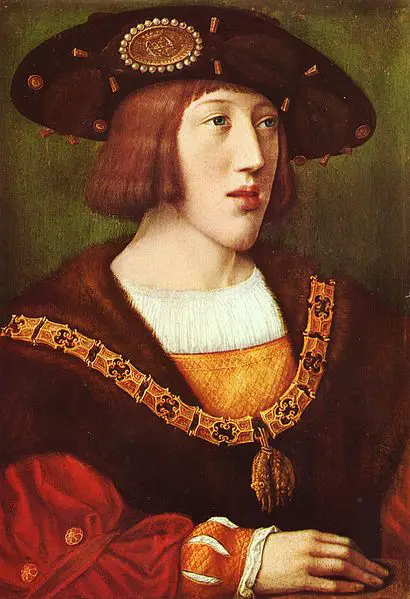
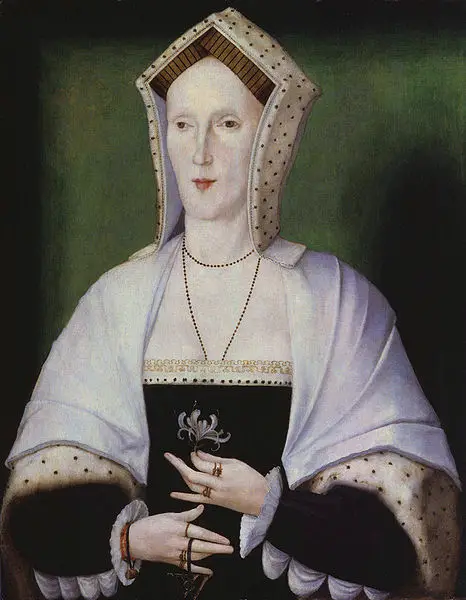
Leave a Reply